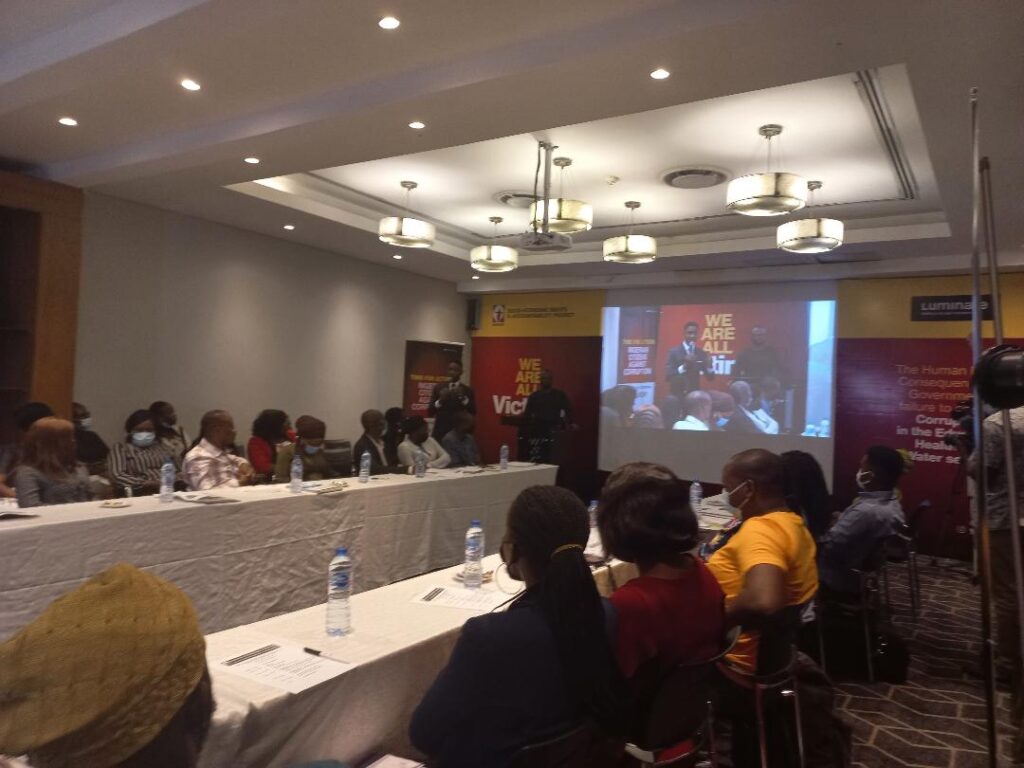Tuesday, December 14, 2021, the Socio-Economic Rights and Accountability Project, SERAP, organized a media roundtable on promoting transparency and accountability in the education, water and health sectors in Nigeria.
The event held in Lagos was attended by journalists from print, electronic, online outfits, students from tertiary institutions within and outside Lagos, as well as activists.
Oluwadare Kolawole, deputy director of the SERAP, who stood in for Adetokunbo Mumuni, his director, in his presentation noted that the human rights consequences of the government’s failure to address corruption in the education, health and water sectors have made virtually all Nigerians victims.
According to him, though our 1999 Constitution as amended is not perfect, “it has all the laws enshrined to deal ruthlessly with corruption from all fronts.”
“Regrettably, like the previous government, the Muhammed Buhari-led administration, at its inception promised to fight corruption tooth and nail but has not accomplished it, years down the line.
“Till date, the Buhari government is yet to obey seven judgments delivered by competent courts, even as our NGO has over 40 lawsuits pending in various courts nationwide on the Freedom of Information FOI Act,” Kolawole stated.
He added that the government has also failed to provide details of the inflows and outflows of funds for the COVID 19 project, updates of the recovered Abacha loot and the Twitter ban issue.
Sadly, Kolawole said a whooping sum of N343, 993,950 and N14, 993,950 respectively are missing from the various ministries in-charge of water resources, while in the education sector, about N3billion is reportedly missing at the treasury of the Universal Basic Education Commission, UBEC.
Yet, in Nigeria with over 200 million people, there are 13million out-of-schools, while the government at the state and federal levels are preaching the gospel of working round the clock to deliver democracy dividends to Nigerians.
The SERAP deputy director urged the media to explore ways and means of promoting transparency and accountability in the education, water and health sectors in Nigeria.
” This present government has not lived up to its expectations of ensuring that there are transparency and accountability in governance by various agencies,” he lamented.
His presentation elicited various reactions from journalists, activists, students as indeed, it was at this stage the hard tackles, the cross-fire, the explosive encounters and the frank and no-holds-barred-talks came to the fore.
A Lagos-based freelance journalist, speaking on the sideline, wondered “if all SERAP does is file lawsuits against the governments, without helping journalists or media houses in distress”
The deputy director of SERAP answered that his NGO filed three lawsuits against the Nigerian Broadcasting Commission, NBC and has also assisted various media houses and journalists with free legal services in the past.
The journalist however called on others with the guts for investigative journalism to use the FOI Act as a tool to question government agencies to release information on inflows and outflows in the three sectors.
In his submission, Ayode Longe, Programme Manager, of Media Rights Agenda, told the gathering that a journalist, who was threatened by one of his sources, approached MRA to sue his source.
A letter was sent to the source, but when the media house the journalist works for got wind of the issue, MRA was advised to step down on the moves.
Longe was responding to a question asked about who protects the journalist from digging deep on stories, exposing corruption, procurement fraud, and embezzlement, asked by a journalist.
The MRA manager explained that journalists who are not allowed by their media outfits to publish or broadcast investigative stories on corruption and fraud could send such reports secretly to other media outfits or credible online news portals for publication or broadcast.
A female staff of Premium Times Center for Investigative Journalism said “practising ethical journalism is the only route to promoting transparency and accountability in the education, health and water sectors in the country”.
Supporting the PTCIJ staff, another female journalist from The Cable, an online news portal, lamented that the challenges facing serious journalism practice are NUJ and NGE, describing these journalism associations “as government contractors, who are more into dishing awards to politicians instead of concentrating on exposing corruptions”.
It was noted that beats associations are the hindrances for some journalists with the zeal and determination to practise ethical journalism.
His words: “Presidents or chairmen of some of these beats seem to be too powerful and could influence the flow of stories that are not in favour of their sources or clients”.
In her reaction, Roqeebat Sulaimon, a 500-level Law student at the University of Lagos noted that she was happy to note that journalists and other participants at the roundtable focused on the need for journalists to be courageous, use FOI Act as a tool to obtain information from government agencies, and play down on beat associations.
Deji Ogunsola, Editor, Yabatech Radio, in his contribution advised that journalists should embark on what he termed “aluta” style of writing their reports so as to exposé corruption by politicians and government leaders.
He claimed that even as a son of a politician in Ibadan, Oyo state, I go to the streets to participate in protests with my friends and colleagues.
At the end of the hard tackles, it was widely agreed that journalists and the media could speak more with the people than pitching their tents with the government.


